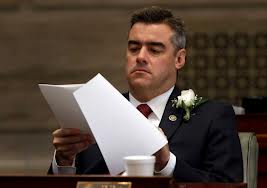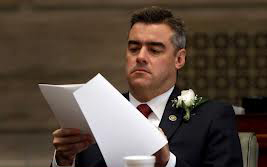by Collin Reischman
Jefferson City, MO — Senate Pro Tem Tom Dempsey proposed three rule changes for the Senate in the Jan 28 session. While all of the rules passed, SR 66— which  would close a loophole in Senate rules allowing a senator to refuse to close their motion and cease engaging in debate — was nearly defeated on the floor by Senator Schaaf.
would close a loophole in Senate rules allowing a senator to refuse to close their motion and cease engaging in debate — was nearly defeated on the floor by Senator Schaaf.
The rule change was inspired in the final weeks of the last legislative session. During debate, then-Senator Jason Crowell was asked to close his motion once debate and discussion had ended. He refused and took his seat. Parliamentary rules have no clear mechanism for this maneuver, and the move effectively had the same affect of a filibuster, without requiring the work.
“This rule change is meant to say that if you want to filibuster, then you need to do the work and actually filibuster,” Dempsey said on the floor. “Any senator has the right to filibuster, but to simply refuse to close and sit down, that’s not a filibuster and all it does is slow us down.”
Dempsey said the incident last year caused confusion in the Senate, with unclear procedures on how to proceed after Crowell took his seat. Schaaf, who opposed the rule change and was one of 9 senators last year supporting Crowell’s position when he refused to close, offered several substitute amendments on the floor to Dempsey’s resolution, in an effort to slow the vote.
Schaaf proposed three separate substitute amendments, renaming the new rule the “Crowell Rule,” “The Jason Crowell Rule,” and the “Senator Jason Crowell Rule.” Schaaf held the floor for more than half an hour, entertaining questions and requesting readings of each amendment, making a clear attempt to begin filibustering the new rule.
“The proposed change will take power from the individual senators and consolidate the power in the leadership,” former senator Crowell told The Missouri Times. “I was able to use that parliamentary procedure to stop things like utility rate hikes, bonding borrowing schemes, tax increases and special tax credits for St. Louis insiders. I believe they are tryig to limit the power of the few remaining true conservatives who are left in the senate.”
Once Schaaf’s amendments were acted on (none passed), he was offered the chance to close his motion. He refused, like Crowell last year.
“My belief is that I’ll refuse right now to close, and we’ll work it out right now, and we won’t need the rule change,” Schaaf said. “I believe this change deludes the power of the individual senator and I believe we don’t need it. This rule has been in place for a century and until [Senator Crowell] did what he did, it was never an issue.”
 After a point of order and a ruling, Schaaf lost the floor and the Senate moved forward. However, the precedent set by the body with regard to Schaaf’s refusal to close may have established the necessary framework for future rulings, should the matter arise again. For an extended period after the ruling, the senators debated on the floor whether or not what they had just done solved the problem, or exacerbated it.
After a point of order and a ruling, Schaaf lost the floor and the Senate moved forward. However, the precedent set by the body with regard to Schaaf’s refusal to close may have established the necessary framework for future rulings, should the matter arise again. For an extended period after the ruling, the senators debated on the floor whether or not what they had just done solved the problem, or exacerbated it.
“I think, possibly, that the result of [Senator Dempsey’s ruling] on that point of order, I think it may have just established a precedent worse than anything those opposed to this new rule might have imagined,” Senator Ryan Silvey said on the floor. “I just want us to leave here with a clear understanding of what we just decided.”
Another rule, which disallowed the use of question-splitting, a tool sometimes used by legislators to vote in favor of one portion of a bill, but against another portion. The rule passed with almost unanimous support, with Senator Schaaf as one of the only votes against. Schaaf said splitting the question was a necessary tool for legislators when handling large pieces of legislation.
“This is something for our benefit, to allow us to be clear about how we feel about a bill,” Schaaf said. “I just wouldn’t expect this to be such an issue, this is something I’ve used before in the House, when I agreed with one part of a bill but not another.”
Ramifications of the ruling on Schaaf are still unclear, and the Senate continued to debate for almost an hour, before finally adopting Dempsey’s rule change and adjourning because of time constraints related to the state of the State.
Collin Reischman was the Managing Editor for The Missouri Times, and a graduate of Webster University with a Bachelor of Arts in Journalism.



